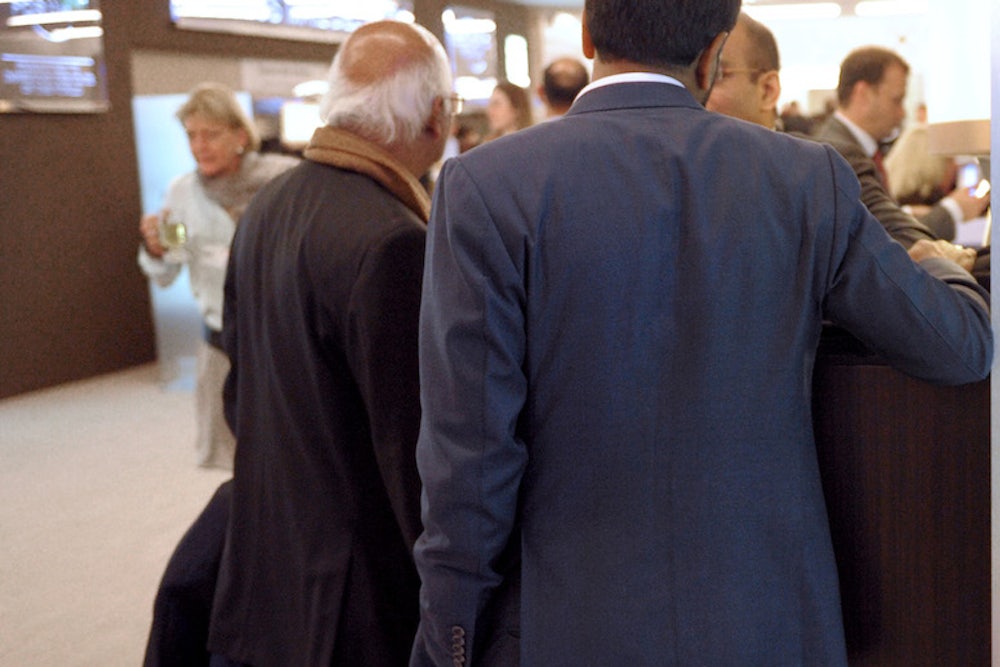“We need to make our case with metrics, framed in a language that businessmen understand.” That’s what Thomas Campbell, the director of the Metropolitan Museum of Art, had to say the other day, while attending the World Economic Forum in Davos. My heart sank when I read these words. They may be the saddest words ever spoken by the director of a major museum. Campbell had begun by complaining that at Davos culture was “an add-on,” “the entertainment”—and I can sympathize with his frustration on that score. But Campbell’s problem—and more than five years into his tenure it’s beginning to look like Campbell’s tragedy—is that at the first sign of frustration he’s ready to turn art into a business.
I’ve been told by people close to Campbell that I misunderstand him. I’ve been told that deep down he’s still the scrupulous scholar who as a curator at the Metropolitan produced what are probably the two greatest tapestry shows ever mounted in a museum. But the gifts that make a great curator (visual refinement, historical imagination) are not necessarily the gifts required to be a great museum director, who must make the case for art’s elusive, transcendent powers in the face of a world dominated by the rapacity of metrics, big data, and businessmen who live and die by such measures. I don’t think Campbell meant any harm to the arts when he argued at Davos that what he called “the culture industry” had to connect with the rest of the world “at a deeper socioeconomic level.” The effect of Campbell’s words, however, was to deny art the unique, stand-alone power it must have in a modern society.
The trouble with Campbell is that he imagines the only way to speak truth to power is in a language you’re absolutely sure the powerbrokers understand. But the great cultural arbiters have always taken an altogether different approach. They have taken it upon themselves to reimagine the nature of power. They have set out to convince the people with the fat bank accounts and the political clout that transcendent values are urgently important, an essential aspect of a healthy democratic society. What the great cultural arbiters have always done is insist on the power of art in the face of other kinds of power—the power of bottom lines, flow charts, metrics, big data.
In 1906, when the visionary English critic Roger Fry worked for a time at the Metropolitan Museum of Art, he wrote about the language of art in a short essay called “Ideals of a Picture Gallery,” published in the Metropolitan’s Bulletin. Fry was certainly familiar with the businessman’s mentality; he labored under often frustrating circumstances at the Metropolitan, and had difficult run-ins with the financier J. P. Morgan as he tried to build the museum’s European painting collection. But this did not prevent Fry from insisting that museum people speak their own language. He wanted to “arouse an understanding of that most difficult but most fascinating language of human emotions, the language of art. It is a language which is universal, valid for all times and in all countries, but it is a language which must be learned though it is more natural to some than to others.”
Apparently Thomas Campbell doesn’t believe that this universal language can be spoken at Davos. Yes, of course, cultural institutions need to stay in the black. But profit and loss have an entirely different meaning in a museum than they have in a corporation—at least they ought to. That’s precisely what a museum director needs to be explaining at Davos. The museum director must insist that the business people learn to speak the language of the museum, which is the language of sight and sensation, of surprise and inspiration. Our society profits immeasurably when even one individual, a person who has paid next to nothing to go into the Metropolitan Museum of Art, spends a few minutes looking at an Egyptian carving, a Medieval ivory, a Coptic textile, or a landscape by Corot. Museum directors have a moral obligation to argue for those ineffable profits. That’s not easy to do. But nobody ever said being the director of one of the world’s greatest museums would be easy.
